With Ridley Scott’s highly anticipated Gladiator II about to hit screens, many of us have turned our thoughts to the arena. While the kind of sword and sandal historical epics that Gladiator pays homage to may have largely gone out of style in the present day, there are plenty of books about the blood and dust and the tragedy and triumph of gladiatorial combat.
From the real history of the Roman games to the accuracy (or lack thereof) of their cinematic depictions, and from historical fiction to high fantasy, these 8 novels about gladiators from ancient Rome and beyond are sure to get the thumbs up from readers!
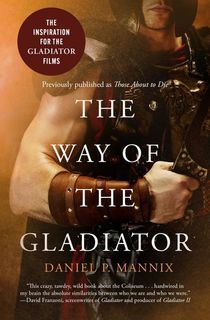
The Way of the Gladiator
Hailed as the inspiration for both Gladiator and Gladiator II, the screenwriter of the first film called Daniel Mannix’s book “crazy, tawdry, wild,” while the Los Angeles Times raved, “If you can imagine a superior American sports writer suddenly being transported back in time to cover the ancient Roman games, you will have some idea of the flavor and zest of The Way of the Gladiator.”
Covering the entire history of the Roman Empire’s national sport, Mannix’s book is a must-read for those who are interested in the real-life stories that inspired the films. This book was also published as Those About to Die, which became the basis for the Peacock original series of the same name.
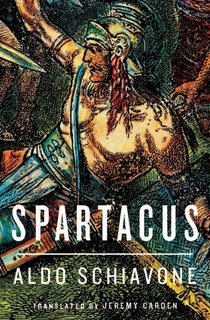
Spartacus
There may be no more legendary gladiator story than that of Spartacus, immortalized on film many times, most famously in the Academy Award-winning 1960 version from Stanley Kubrick, starring Kirk Douglas.
But while he was already a myth in his own time, Spartacus was a real person, and in this “intelligent, learned, and challenging account” (New York Review of Books), author Aldo Schiavone separates the man from the myth and brings you “the straight dope” (Maclean’s) about the real-life Spartacus and the age in which he lived.
Read it to see why Publishers Weekly raves that “both the newcomer and the experienced Roman historian will find a wealth of entertainment and information” in its pages.
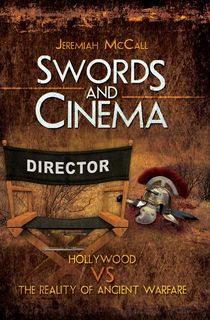
Swords and Cinema
At one time, so-called “swords and sandals” epics dominated the Hollywood box office. While steeped in the idea of ancient Rome, these films weren’t always the most authentic to actual history.
From classics like Spartacus to more recent inclusions such as Ridley Scott’s original Gladiator or Zack Snyder’s 300, “Jeremiah McCall impresses us with detail on the motion pictures relevant to ancient history” (UNRV.com) as he examines the battles of classical antiquity as they have been presented on film, and addresses just how accurate (or not) the Hollywood depictions of these clashes might be.
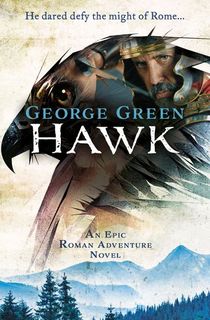
Hawk
The Guardian called George Green’s Hound “an impressive first novel,” while Manda Scott, author of Boudica, hailed it as “the ultimate warrior’s tale.” In this highly anticipated prequel, Serpicus, a beast-hunter who supplies dangerous animals for the gladiatorial games, is sent to Germania to capture what may be his deadliest quarry to date.
Surrounded by danger and with a traitor in his midst, even Serpicus is unprepared for what is waiting for him in that distant land, where he will find revelations that challenge his loyalties and turn his world upside down in this epic novel of ancient Rome.
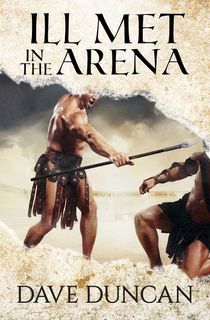
Ill Met in the Arena
In a world where gladiatorial battles are fought using teleportation and telekinesis, Quirt is one of the oldest gladiators still practicing the games, but his undeniable skill has kept him safe and poised at the top of the circuit.
Among his recent challengers is an up-and-coming fighter named Humate, a powerful but undisciplined young competitor in the games. Humate has a lot to learn from Quirt as “complicated politics and family scandals twist through this tale of courtly intrigue from prolific fantasist Duncan” (Publishers Weekly).
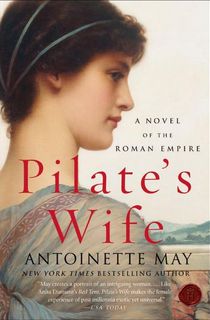
Pilate's Wife
“Readers who thrilled to Russel Crowe’s Gladiator will give Pilate’s Wife the thumbs-up” raves USA Today about this “great and insightful drama” (The Cairns Sun) which mixes historical fiction and Biblical epic into the tale of Claudia, daughter of the most powerful empire in the world, whose dreams and premonitions have a way of coming true.
Even as she is drawn to the arms of an ambitious magistrate named Pontius Pilate, she finds herself embroiled in visions of bloodshed and devastation, and the crucifixion of a divine martyr that she becomes determined to try and save.
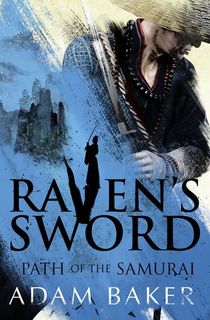
Raven's Sword
Set in Japan’s Warring States period, Adam Baker’s novel follows an orphaned girl who must prove herself as a samurai if she hopes to survive. However, as rival warlords devastate the land with their battles for supremacy, she finds herself cast into a seemingly hopeless death-match, a brutal gladiatorial competition from which only one may emerge alive.
“For the Samurai, death is not to be feared,” the back cover declares. “It is to be embraced.” Is she ready to embrace death, or will she find a new future on the bloody arena floor?
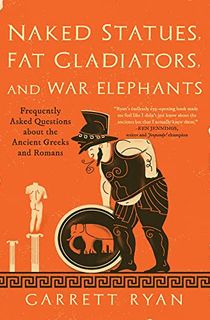
Naked Statues, Fat Gladiators, and War Elephants: Frequently Asked Questions about the Ancient Greeks and Romans
“It’s amazing what they don’t teach you in school,” writes Jeopardy! Champion Ken Jennings of Garrett Ryan’s fascinating new book. As a teacher himself, Ryan begins most of the short, humorous essays contained within with a question that he has been asked by students in his classes. Did the ancient Greeks and Romans shave? Did they go on vacation? Did they believe in aliens?
“Bursting with colorful anecdotes, stuffed with vivid details, and with a ‘you are there’ immediacy, this highly entertaining, engagingly written book pairs a scholar’s erudition with a lively sense of humor” (Prof. Gregory S. Aldrete, author of Daily Life in the Roman City), and will make you feel like you are walking the streets—or standing in the sand of the arena—with the ancient people it describes, from nobility to common folk to gladiators and beyond.

